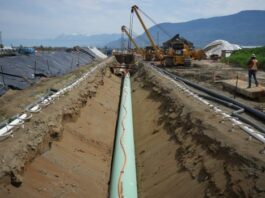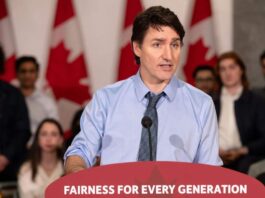
Political circumstances and the pandemic’s harsh reality have finally forced the debate over paid sick leave in Ontario a step closer to a reasonable conclusion.
But so little should not have taken so long.
The unnecessary public drama over the past week has been painful to behold — not least because while provinces were flailing away at an imperfect federal program, vulnerable people were still being denied a valuable protection against a deadly virus.
“This is a game-changer and this will save lives,” Ontario Labour Minister Monte McNaughton said Wednesday.
McNaughton’s offer of three paid sick days might help, though it falls well short of the 10 days called for by workers’ advocates.
But his claim about saving lives would resonate much more if it wasn’t being made 14 months into this pandemic — and after nearly 8,000 Ontarians have died.

To contain a contagious disease, it makes sense to encourage people to stay home when they feel sick. But not everyone can easily afford to do so. According to data from 2016, 58 per cent of Canadian workers reported having no access to employer-paid sick leave. Among those earning less than $25,000 per year, 74 per cent said they had no employer-paid sick leave.
The vast majority of workplaces in Canada are regulated by provincial labour laws. When the pandemic began, just two provinces were requiring employers to offer their employees paid sick leave. Quebec requires two days sick leave; P.E.I. which was offering just one day when the pandemic began, has since expanded mandated sick leave to three days.
When calls for broader access to paid sick leave began getting louder last spring, NDP Leader Jagmeet Singh took those demands to the federal government. As part of a deal with the NDP to proceed with extraordinary summer sittings, the Liberals agreed that they would raise the issue with the provinces.
A poor substitute
The Trudeau government subsequently announced a “safe restart” agreement with the provinces that included the Canada Recovery Sickness Benefit (CRSB), a federal program delivered through employment insurance that would pay people $500 per week for up to two weeks — later expanded to four weeks — if they needed to stay home.
But this was only a kind of sick leave. As would eventually become clear, it was a second-best substitute for fully mandated paid sick leave — which would be automatic and required by law.
“So let’s say I wake up today and I’ve got a fever. If I had employer-paid sick days, I would just be able to stay home,” Deena Ladd of the Workers Action Centre said in an interview this week. “I wouldn’t have to think about my wages. I wouldn’t have to think about making ends meet, because I’m covered.”

To qualify for the CRSB, a worker has to have missed at least half of their scheduled work week. Individuals have to apply for the benefit and, if approved, wait for the money to arrive. That can take several days or more.
Those delays and that lack of certainty can be major problems for people who are just getting by.
“The main issue is the ability to immediately act — the ability to immediately make the decision about staying home and being safe, and the confidence that your wages are going to not be interrupted,” Ladd said.
The federal benefit did still help some people — it has so far paid out $435 million to 485,000 unique applicants — but the uptake was lower than expected. And calls for better paid sick leave continued to pile up over the last several months.
An excuse for inertia
In fairness to the federal government, it could only do so much without provincial law — though it still might have made the CRSB more generous. But in trying to do something, did the Liberals create a moral hazard that made it easier for other actors to avoid a real solution?
Normally, provincial governments are jealous guardians of their own authority. Just last fall, lawyers from Ontario and several other provinces were in front of the Supreme Court claiming that the federal carbon-pricing law was an unconstitutional intrusion into provincial jurisdiction.
In this case, provinces apparently were quite happy to let the federal government act. And the CRSB also became a handy political excuse for provincial inaction.
“We aren’t going to duplicate and waste taxpayer’s money, double-dipping into their pockets,” Ontario Premier Doug Ford said in February.
A premier might see reasons to avoid putting paid sick leave into provincial law. Businesses struggling to get through the pandemic would complain about any additional costs. Once the pandemic is over, there might be significant political pressure to maintain the allowance.
But should such concerns be allowed to stand in the way of action if lives are at stake and preventing human suffering is the goal?

“[The federal government has] done a lot of great things over the past 14 months, but this is not one of them,” British Columbia Premier John Horgan said Tuesday — as if his own government couldn’t have taken responsibility for its own jurisdiction months ago.
In responding to the pandemic, the federal government has fared best when it has used its spending power and resources to support provincial action.
But the sick leave saga recalls another imperfect attempt to use a federal program to address a problem entirely within provincial purview: commercial rent relief. Then-federal finance minister Bill Morneau later conceded that the federal support should have been paired with provincial restrictions on the ability of landlords to evict tenants.
That lesson should have been applied to sick leave. In return for provinces enacting paid sick leave laws, the federal government could have offered to help compensate struggling businesses for the cost. Something like the CRSB could have been maintained for contract workers.
Instead, too many Canadian workers have gone too long without full paid sick leave — and workers in Ontario might only be getting three days now because of a political crisis in that province.
This policy still might save some lives in the days and weeks ahead. But the question now, as a third pandemic wave hammers many communities, is how much suffering could have been prevented had provinces implemented a real paid sick leave program months ago.












